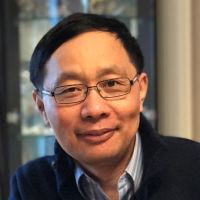Targeting Tumor-Associated Antigens in Hepatocellular Carcinoma for Immunotherapy: Past Pitfalls and Future Strategies.
Date
2020-08-07
Journal Title
Journal ISSN
Volume Title
Repository Usage Stats
views
downloads
Citation Stats
Attention Stats
Abstract
There are few treatment options for advanced-stage hepatocellular carcinoma (HCC). Targeting tumor-associated antigens (TAAs) for HCC immunotherapy has been tested clinically for many years with limited success. Recent advances in applying mutated tumor-specific neoantigens as immunotherapeutic targets raise hope that this class of antigens may be used in HCC treatment. Accordingly, multiple clinical trials have been initiated to test this concept. However, recent findings demonstrate that mutated neoantigens are rarely detected while unmutated antigens derived from TAAs are represented in the HLA ligandomes of HCC patients, suggesting a requirement to target TAAs for HCC immunotherapy. Herein, we review the potential pitfalls of previous clinical applications of targeting TAAs in HCC immunotherapy. Based on further understanding of the roles of different arms of adaptive immunity in antitumor immunity, we provide a perspective on how to address the unsatisfactory previous immunotherapy attempts in HCC. We propose a new vaccine platform that enhances all three arms of the adaptive immune system to improve TAA-based cancer vaccination in HCC patients. As many solid tumors with low and intermediate mutation burdens have similar TAA and neoantigen expression and presentation patterns, the new vaccine platform is broadly applicable. In conclusion, targeting TAA in HCC for immunotherapy is necessary and new strategies are needed to improve clinical efficacy.
Type
Department
Description
Provenance
Citation
Permalink
Published Version (Please cite this version)
Publication Info
Lu, Ligong, Jun Jiang, Meixiao Zhan, Hui Zhang, Qian-Ting Wang, Sheng-Nan Sun, Xiao-Kai Guo, Hua Yin, et al. (2020). Targeting Tumor-Associated Antigens in Hepatocellular Carcinoma for Immunotherapy: Past Pitfalls and Future Strategies. Hepatology (Baltimore, Md.). 10.1002/hep.31502 Retrieved from https://hdl.handle.net/10161/21382.
This is constructed from limited available data and may be imprecise. To cite this article, please review & use the official citation provided by the journal.
Collections
Scholars@Duke

You-Wen He
We study T cell biology in health and disease. Our current study is divided into two parts. Part I is to investigate T lymphocyte-mediated anti-caner immunity. We have found that host complement inhibits the cytokine IL-10 production in CD8+ tumor infiltrating lymphocytes through complement receptors C3aR and C5aR. Complement-deficient animals are resistant to tumor development in a T cell- and IL-10-dependent manner. CD8+ tumor infiltrating T cells express IL-10 when complement signaling is disabled. We found that tumor infiltrating lymphocytes from human cancers expanded with IL-2 plus IL-10 are potent tumor killers. Complement-mediated inhibition on antitumor immunity is independent of the PD-1/PD-L1 immune checkpoint pathway. Our findings suggest that complement receptors C3aR and C5aR expressed on CD8+ tumor infiltrating lymphocytes represent a novel class of immune checkpoints that needs to be targeted for tumor immunotherapy. Our current effort is to enhance cancer immunotherapy through several strategies. First, we investigate a combined blockade of complement signaling and anti-PD-1 to enhance the antitumor efficacy; second, we are studying the antitumor efficacy of a targeted delivery of IL-10 to antitumor CD8+ T cells by using anti-PD1-IL-10 or anti-CTLA-4-IL-10 fusion proteins; third, we are studying the tumor killing efficacy of addition of IL-10 in the expansion protocol of tumor infiltrating lymphocytes for adaptive cellular therapy.
Part II is to investigate the intracellular process termed autophagy in T lymphocyte function. Autophagy is a highly conserved self-digestion pathway that plays essential roles in maintaining the homeostasis of organelles, degrading long-lived proteins and recycling amino acids under starvation conditions. We have found that autophagy related molecules are expressed in T lymphocytes and autophagy occurs inside T lymphocytes. We have generated autophagy-deficient T lymphocytes in multiple genetic models and investigated the roles of autophagy in T lymphocytes. We found that autophagy plays a critical role in T lymphocyte function. Our current effort is to elucidate the molecular pathways by which TCR signal induces autophagy and the impact of autophagy on intracellular organelle homeostasis in dividing T cells.
Unless otherwise indicated, scholarly articles published by Duke faculty members are made available here with a CC-BY-NC (Creative Commons Attribution Non-Commercial) license, as enabled by the Duke Open Access Policy. If you wish to use the materials in ways not already permitted under CC-BY-NC, please consult the copyright owner. Other materials are made available here through the author’s grant of a non-exclusive license to make their work openly accessible.
